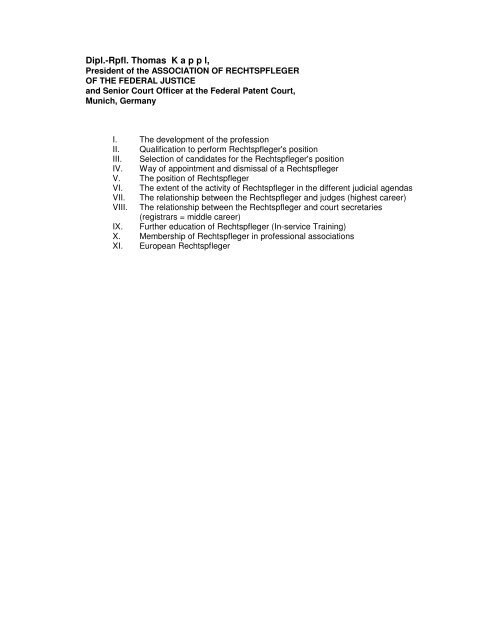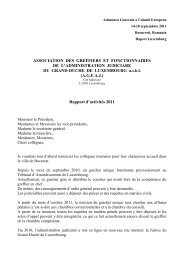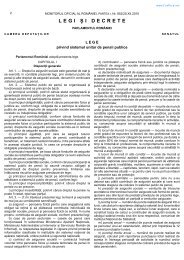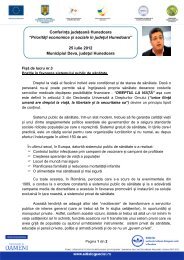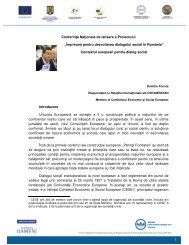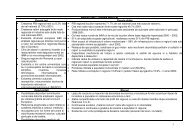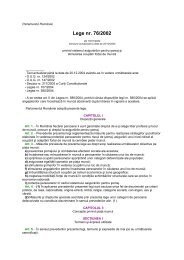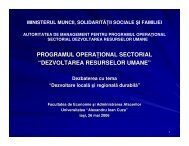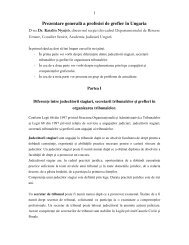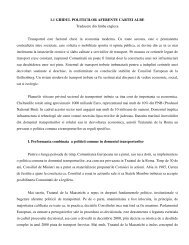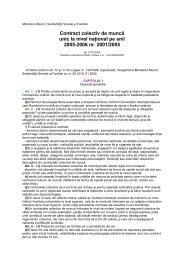Dipl.-Rpfl. Thomas K a p p l, - CSN Meridian
Dipl.-Rpfl. Thomas K a p p l, - CSN Meridian
Dipl.-Rpfl. Thomas K a p p l, - CSN Meridian
You also want an ePaper? Increase the reach of your titles
YUMPU automatically turns print PDFs into web optimized ePapers that Google loves.
<strong>Dipl</strong>.-<strong>Rpfl</strong>. <strong>Thomas</strong> K a p p l,<br />
President of the ASSOCIATION OF RECHTSPFLEGER<br />
OF THE FEDERAL JUSTICE<br />
and Senior Court Officer at the Federal Patent Court,<br />
Munich, Germany<br />
I. The development of the profession<br />
II. Qualification to perform Rechtspfleger's position<br />
III. Selection of candidates for the Rechtspfleger's position<br />
IV. Way of appointment and dismissal of a Rechtspfleger<br />
V. The position of Rechtspfleger<br />
VI. The extent of the activity of Rechtspfleger in the different judicial agendas<br />
VII. The relationship between the Rechtspfleger and judges (highest career)<br />
VIII. The relationship between the Rechtspfleger and court secretaries<br />
(registrars = middle career)<br />
IX. Further education of Rechtspfleger (In-service Training)<br />
X. Membership of Rechtspfleger in professional associations<br />
XI. European Rechtspfleger
2<br />
I. The development of the profession<br />
Rechtspfleger is an expression of a legal profession in Germany which cannot be<br />
translated into another language. For that reason I am going to use the expression<br />
Rechtspfleger in my report. The profession of Rechtspfleger can be described as follows:<br />
Senior court official, competent in certain judicial<br />
decisions and jurisdiction, especially matters<br />
of non-contentious jurisdiction.<br />
The job description of the Rechtspfleger, as we find it today in the administration of justice<br />
in Germany, is the result of a development which started in the beginning of the last<br />
century.<br />
In 1877 many activities of the jurisdiction over non-contentious matters were transferred<br />
to judges, like:<br />
- matters relating to guardian and ward;<br />
- matters relating to probate;<br />
- registration of land titles;<br />
- commercial registration;<br />
- registration of co-operatives;<br />
- registration of associations;<br />
- registration of ships;<br />
- registration of aircrafts;<br />
- authentications.<br />
The transfer caused an overstrain on the judges. The judges could no longer perform<br />
matters in civil and criminal proceedings carefully. They had to be discharged of matters<br />
of non-contentious jurisdiction.<br />
Since 1909 the activities of judges have been transferred to the Rechtspfleger, first by<br />
administrative orders later by the law of Rechtspfleger of 1957, 1969 and 1970.<br />
The Rechtspfleger now carries out these tasks independently and only bound by law, (§ 9<br />
Law of Rechtspfleger).
3<br />
II. Qualification to perform Rechtspfleger's position<br />
To become a Rechtspfleger one have to study at the university for applied science for<br />
three years which is laid down by § 2 Law of Rechtspfleger. This institution is a<br />
professional school where students do their law studies. During this education the<br />
students are appointed for temporary civil servants. They are not employees and do not<br />
get a contract of employment. They already get a salary as subsistence allowance of 860<br />
Euro per month. The education is divided into a theoretical and practical part. The<br />
theoretical studies take 24 months and the practical training takes 12 months at the<br />
courts.<br />
The theoretical studies are divided into two parts; each takes 12 months.<br />
Lessons of the first part:<br />
Subjects<br />
Lessons<br />
Civil Code - law of contract 79<br />
Law of obligations 77<br />
Property law over movable 27<br />
Property law over immovable 77<br />
Flat property and apartment ownership 16<br />
Hereditary building right 10<br />
Covering operation and hedge transaction 38<br />
Family law 49<br />
Law of guardianship 76<br />
Law of succession 115<br />
Code of the proceeding of voluntary jurisdiction 21<br />
Law of Rechtspfleger 12<br />
Land Registration Code 73<br />
Code of Civil Proceeding 60<br />
Law of court fees 40<br />
Federal Code of Lawyer's Fees 25<br />
Computer lessons 120<br />
Study groups 156<br />
Exams 80<br />
Discussion about the exams 12<br />
Computer test 1<br />
_____<br />
Total 1155
4<br />
Lessons of the second part:<br />
Subjects<br />
Lessons<br />
Public law, constitutional law, administrative law 70<br />
Law of obligations 37<br />
Covering operation, hedge transaction 21<br />
Code of Civil Proceeding 12<br />
Commercial law, corporation and partnership law 68<br />
Registration law 41<br />
Negotiable instruments law 22<br />
Execution law 99<br />
Law on compulsory sale of real property, aircraft<br />
and ships 84<br />
Insolvency law 86<br />
Criminal law 21<br />
Code of criminal proceeding 38<br />
Law of execution of criminal sentences 34<br />
Law of court fees 40<br />
International private law, European Community law 31<br />
Flat property and apartment ownership 11<br />
Study groups 216<br />
Exams 80<br />
Discussions about the exams 12<br />
______<br />
Total 1023<br />
To study at these professional schools of higher education, which is an university for<br />
applied science, it is neccessary to pass the final examination at secondary school<br />
(Abitur, Matura, baccalauréat). In Germany there are eight universities for applied science<br />
for Rechtspfleger:<br />
Berlin:<br />
Hildesheim:<br />
Bad-Münstereifel:<br />
Rothenburg:<br />
for Berlin and Brandenburg<br />
for Niedersachsen, Bremen, Hamburg, Schleswig-Holstein and<br />
Sachsen-Anhalt<br />
for Nordrhein-Westfalen<br />
for Hessen and Thüringen
5<br />
Schwetzingen:<br />
Starnberg:<br />
Meißen:<br />
Güstrow:<br />
for Baden-Württemberg, Rheinland-Pfalz and Saarland,<br />
for Bayern<br />
for Sachsen<br />
for Mecklenburg-Vorpommern<br />
III. Selection of candidates for the Rechtspfleger's position<br />
Candidates have to apply to the Ministry of Justice of the Federal State or to the Higher<br />
Regional Court (as in Bavaria). The Federal States are competent in the course of study<br />
for Rechtspfleger. The Federal Ministry of Justice in Berlin is only competent in the<br />
legislation, also for the Law of Rechtspfleger. The Ministries of Justice of the Federal<br />
States enact the regulations for the course of study for Rechtspfleger at the professional<br />
schools of higher education.<br />
Candidates have to submit the certificate of the school leaving examination at grammar<br />
school needed for entry to higher education (Abitur-certificate). They also have to pass an<br />
entrance examination which is held by the Ministry of Justice of the Federal State or by<br />
the Higher Regional Court (Oberlandesgericht). In Bavaria the entrance examination is<br />
held by a special institution, called State Examination Office. The entrance examination is<br />
held for all candidates who want to become an official in any field, like justice or<br />
department with responsibility for fiscal matters or the administration of the State etc. On<br />
the basic of the result the Ministry of Justice will choose the applicants and appoint them<br />
as a temporary civil-servant to study at the professional school for higher education. Each<br />
Federal State will appoint only as many candidates as Rechtspfleger will be needed at the<br />
end of the course of study.<br />
The entrance examination includes a written and a oral part and contains questions on<br />
different subjects like general knowledge, historical knowledge, the German language<br />
and maths to check the capability of logical thinking.<br />
IV. Way of appointment and dismissal of a Rechtspfleger<br />
After passing the examination successfully the students get the academic degree<br />
"<strong>Dipl</strong>om-Rechtspfleger" and they have now the authority to perform all duties of<br />
Rechtspfleger which are laid down by the Law of Rechtspfleger. They will be appointed as<br />
civil servants (official) on probation. The probation lasts for two and a half years. At the<br />
age of 27 the civil servant on probation will be appointed to an official "for life". If someone
6<br />
is appointed to an official "for life", he usually cannot be dismissed. An official "for life" can<br />
only be dismissed,<br />
a) if he refuses to take the official oath, or<br />
b) if he is a member of Parliament at the time of his appointment, the position is<br />
incompatible with the membership of Parliament and he does not resign his seat after<br />
a period which was set by the Ministry of Justice, or<br />
c) if he moves into a foreign country without any permission of the Ministry of Justice, or<br />
f) if he is not a citizen of Germany or of a memberstate of the European Union, or<br />
g) if he is appointed by another employer, or<br />
h) if he wants to be dismissed.<br />
He also can be dismissed because of a serious disciplinary penalty.<br />
V. The position of Rechtspfleger<br />
1. As a civil servant (official)<br />
During the practise of his profession the Rechtspfleger is a civil servant, an official of the<br />
higher career. In Germany there are four careers which are<br />
- lower career (constable of court),<br />
- middle career (registrar, competent in keeping the files and the registration and<br />
making the records of the civil and criminal proceedings),<br />
- higher career (Rechtspfleger and administrative official),<br />
- highest career (judge and administrative official).<br />
An official can refer to all rights laid down by the Federal Law of Officers. These rights are<br />
for instance:<br />
- The social security getting from the employer (State), like support for the costs for<br />
medical treatment of himself and of his family, maternity leave, vacation for<br />
upbringing children without being dismissed and losing the position of an official<br />
"for life", part-time work, job-sharing;<br />
- Promotion; he begins his career as a Justizinspektor and can be promoted to Justizoberinspektor,<br />
Justizamtmann, Justizamtsrat and Justizoberamtsrat;<br />
- Salary; the amount of the salary depends on the step which the Rechtspfleger has<br />
reached. A Rechtspfleger, not married, earns at the beginning of his career a gross<br />
income of 2100 Euro per month, at the end of his career a gross
7<br />
income of 4100 Euro;<br />
- Using the name of his position like Justizinspektor, Justizoberinspektor, Justizamtmann,<br />
Justizamtsrat, Justizoberamtsrat. He uses the name of his position only as<br />
an administrative official. As a Rechtspfleger, if he will perform tasks of jurisdiction<br />
as an independent institution of jurisdiction, he uses the name of his function, which<br />
is "Rechtspfleger" as it is laid down by the Law of Rechtspfleger.<br />
- Vacations; the length of the vacations depends on the age of the official,<br />
- up to the age of 29: 26 days, Saturday and Sunday not included,<br />
- from the age of 30 to 39: 29 days,<br />
- from the age of 40: 30 days.<br />
Additional he may get special vacations for wedding, birth of a child, death of a child<br />
or spouse, participation on meetings of the professional association, if he is a<br />
functionary.<br />
- inspection of the personal file;<br />
- getting references. The references are important for promotion.<br />
The officials have also to carry out their duties which are:<br />
- Loyalty to the political system,<br />
- loyalty to their employer (State),<br />
- duty to perform all tasks in the best manner,<br />
- duty to carry out the instructions of the superior - that does not count for<br />
performing tasks of jurisdiction,<br />
- duty of impeccable character and behaviour<br />
- duty of living nearby the job.<br />
2. As a Rechtspfleger (independent institution of jurisdiction)<br />
The activities of the Rechtspfleger are regulated by the law of Rechtspfleger. These tasks<br />
must be handled only by a Rechtspfleger. Therefore every court of first instance, the<br />
Labour Court and even the Federal Patent Court must have a property constituted<br />
Rechtspfleger. Usually several Rechtspflegers work at every court. At the beginning of<br />
each year the competences of the Rechtspflegers have to be regulated by the<br />
assignment of business. During the year it is only possible to change the assignment for<br />
important reasons. The substitutions of those Rechtspflegers who are not able to handle<br />
a certain case must be also regulated. This is the principle of the legal judge.
8<br />
The decisions of Rechtspflegers cannot be appealed by a petition for administrative<br />
review because in this case the Rechtspfleger is not an official who is bound by<br />
instructions of an superior. The decisions of the Rechtspfleger can only be contested by<br />
an appeal to the next instance, because the Rechtspfleger is an independent institution of<br />
jurisdiction and only bound by law (§ 9 Law of Rechtspfleger).<br />
VI. The extent of the activity of Rechtspfleger in the different judicial agendas<br />
1. As a civil servant (administrative official)<br />
About ten per cent of the German Rechtspfleger are working at the administrative<br />
authority of the courts and at the Ministries of Justice of the Federal States and at the<br />
Federal Ministry of Justice in Berlin. In carrying out these duties the Rechtspfleger are<br />
administrative officials and they are bound by instructions of the superior. There are<br />
different kinds of functions, for instance:<br />
- head of section at the administrative section of the Higher Regional Courts<br />
or at the Ministries of Justice of the Federal States, competent in personal<br />
matters like staff recruitment, personnel management or head of budget<br />
section; etc;<br />
- court manager, responsible for administrative supervision of the registrars<br />
and other staff;<br />
- auditor.<br />
At each regional court there is an auditor. He is the representative of the state treasury.<br />
He gives instructions for the taxation of costs and supervises the officials who have to fix<br />
the costs of justice.<br />
2. As a Rechtspfleger (independent institution of jurisdiction)<br />
The main tasks of the Rechtspfleger, which are regulated in the law of Rechtspfleger, are:<br />
a) Jurisdiction over non-contentious matters<br />
- matters relating to guardian and ward;<br />
- matters relating to probate;<br />
- registration of land titles;
9<br />
- commercial registration;<br />
- registration of co-operatives;<br />
- registration of associations;<br />
- registration of ships;<br />
- registration of aircrafts;<br />
- authentications.<br />
b) Civil cases<br />
- summary proceedings on an order to pay debts;<br />
- judicial sale and sequestration of real estate;<br />
- proceedings in bankruptcy and insolvency;<br />
- taxation of costs of the lawyers;<br />
- changing of judgement for support for children;<br />
- judicial enforcement;<br />
- protection from judicial enforcement;<br />
c) Criminal cases<br />
execution of a sentence;<br />
suspend the execution of a sentence of pecuniary penalty.<br />
d) Description of the tasks<br />
aa) Local court<br />
- guardianship court and family court<br />
The tasks of the Rechtspfleger at the guardianship court are extensive. Judges decide<br />
only on divorces and adoptions at the family court. The Rechtspfleger decides on<br />
matters of property management of legitimate and non-legitimate children. If the<br />
property management is put into danger by the parents, the Rechtspfleger will revoke<br />
the parents' power of property management. The Rechtspfleger also decides on matters<br />
of parental custody of legitimate and non-legitimate children. If the parents want to make<br />
a contract with their children, the Rechtspfleger has to revoke the parental custody<br />
because of conflict of interests between the parents and the children. He also has to<br />
appoint another person as guardian or special curator. A special curator shall be
10<br />
appointed to represent persons who are subject to parental care or guardianship in<br />
matters in which the parents or general guardian may not act for the child.<br />
The Rechtspfleger decrees nearly all guardianships and curatorships which are<br />
necessary for orphans. He selects and appoints guardians and curators. He has to<br />
control and to supervise their management and to give advices to them. If guardians or<br />
the curators do not manage their tasks well, the Rechtspfleger has to dismiss them. For<br />
certain contracts, especially for contracts in respect of real estate, guardians need a<br />
permission by the guardianship court which is given by the Rechtspfleger. The<br />
Rechtspfleger checks the reports on activities and the rendering of accounts. He also<br />
fixes the remuneration for guardians or for curators.<br />
The Rechtspfleger also appoints a curator for persons who are absent and are not able<br />
to perform a legal act.<br />
- Probate court (proceedings on inheritance)<br />
The Rechtspfleger is competent nearly in all tasks at the probate court. It is only reserved<br />
for judges to decide on the issue of the certificate of inheritance in the case of the testate<br />
succession. But it is the task of the Rechtspfleger to declare the testate or intestate<br />
succession after the death of a person. The heirs must be summoned by Rechtspflegers<br />
for opening and reading the will, if one exists. After the death of the testator the probate<br />
court is required to open the will in the presence of interested parties and to announce its<br />
contents. Any person in possession of a will must deliver it to the probate court<br />
immediately upon knowing of the testator's death. If there is no will the Rechtspfleger has<br />
to declare the intestate succession. He also has to establish the identity of an heir and to<br />
draw up the petition for the issue of the certificate on inheritance in the case of testate<br />
and intestate succession. The Rechtspfleger has to decide on the issue of the certificate<br />
of inheritance in the case of intestate succession. For the heir the certificate of inheritance<br />
is necessary to prove his succession in legal relations. If an heir cannot be found at once<br />
a curator of the estate must be appointed by the court. The curatorship of the estate is<br />
decreed by the Rechtspfleger. If the estate is in debt the Rechtspfleger will order an<br />
administration of the estate. The Rechtspfleger selects the curator or the administrator,<br />
checks their management and gives advices to them. In some cases curators or<br />
administrators need the permission of the probate court for making a contract. This is<br />
issued by the Rechtspfleger.
11<br />
- Court of land register<br />
The land register is one of the main fields of duties of the Rechtspfleger. The<br />
Rechtspfleger decides on the following applications:<br />
- entry into the land registration in the case of acquisition of ownership in real<br />
property by purchase, by donation or by succession;<br />
- entry into the land registration of the granting of a permanent dwelling right,<br />
of a right of way and other easements;<br />
- entry into the land registration of a mortgage, of a land charge as a security<br />
of used credits;<br />
- entry into the land registration of condominiums and of leases.<br />
To acquire real estate in Germany a contract by a notary and the entry into the land<br />
registration are necessary. Rechtspflegers have to decide on the entry into the land<br />
registration and he has to check whether the contract by a notary has legal effect. The<br />
entry in the land registration is done by the court clerks of the middle career.<br />
- Registration court<br />
The commercial register, the registration of co-operatives, of associations, of ships and<br />
aircrafts are kept by the registration court.<br />
Sole traders, general commercial partnerships, limited commercial partnerships and<br />
closed corporations must be registrated in the register. Rechtspflegers decide on the<br />
entry. He has to check the contracts by a notary and other requirements for entry into the<br />
register. It is only reserved for judges to decide on the first entry of the joint-stock<br />
company. Rechtspflegers are competent in all other decisions on the entries.<br />
- Civil court<br />
At the civil court Rechtspflegers are competent in summary proceedings on an order to<br />
pay debts. They decide on the issue of the payment order and the writ of execution. The<br />
writ of execution is a document justifying the execution like any other judgement for<br />
enforcement.
12<br />
Rechtspflegers are also competent in the judicial call proceeding in the case of loss of a<br />
mortgage deed, a savings bank book or other certificates which prove certain rights.<br />
Rechtspflegers have to check whether a party to a lawsuit fulfils the requirements for<br />
legal aid. In some cases when legal aid is granted Rechtspflegers have to arrange a<br />
judicial settlement.<br />
People with limited means have the possibility of obtaining legal advice and assistance by<br />
the court. Rechtspfleger have to decide whether these people will be eligible. They also<br />
give them some informations on a point of law, especially concerning the proceedings.<br />
They draw up submissions, including lawsuits and petitions.<br />
- Court of jurisdiction over enforcement<br />
At the court of jurisdiction over enforcement Rechtspflegers have to make all decisions.<br />
They take in execution all rights, all garnishments and earnings by an attachment order<br />
and transfer of garnished claim. They orders the attachment of earnings and wages, the<br />
attachment of claims, for instance a mortgage claim, or a claim of a savings bank book,<br />
or a claim of an assurance.<br />
An important field of responsibility is the proceeding of forced sale of real estate.<br />
Rechtspflegers have to check all claims of the creditors and they have to decide whether<br />
a creditor can take part in this proceeding. After hearing an expert they fix the value of the<br />
real estate. They manage the proceeding and make all decisions, especially the court<br />
order conferring the title to real estate on the purchaser. The purchaser, who makes the<br />
highest bid, gets the ownership of the real estate. At the end of this proceeding the<br />
Rechtspfleger has to split up the proceeds to the creditors.<br />
During the sequestration and the administration of real estate, the Rechtspfleger has to<br />
supervise the administrator, who is appointed by the Rechtspfleger.<br />
The Rechtspfleger also carries out the proceedings in bankruptcy of firms and<br />
enterprises. He supervises the administrator in bankruptcy proceedings and checks the<br />
administrator's management and work. During the proceeding in bankruptcy of a private<br />
person the Rechtspfleger issues an installment plan. He supervises the behaviour of the
13<br />
debtor, especially whether the debtor is paying the fixed installments to the creditors in<br />
time.<br />
- Taxation of costs<br />
The lawyer's fees are sometimes higher than the amount of the dispute. The judgement<br />
only fixes who has to pay the costs. The judgement does not fix the amount of the costs<br />
of the lawyer. The lawyer has the possibility to make an application for taxation of the<br />
costs. The Rechtspfleger orders the payment and the amount of the costs. This order is a<br />
document like a judgement justifying the execution.<br />
bb) Regional Court, Higher Regional Court, Federal Supreme Court<br />
At these courts the Rechtspfleger has to perform tasks in the civil proceedings and the<br />
proceeding on fixing the costs of the lawyer.<br />
cc) Federal Patent Court<br />
The functions of the Federal Patent Court include the rendering of decisions on appeal<br />
against orders of the patent examiners and of the patent division, trademark division,<br />
utility model division and industrial design division of the German Patent and Tradmark<br />
Office. In this proceeding the Rechtspfleger has to check the formalities required for the<br />
appeals. He also decides on petitions on inspecting the proceeding files by a person who<br />
is not a party.<br />
dd) Criminal court and public prosecutor's office<br />
It is the duty of the public prosecutor to bring a charge of a crime against the defendant, it<br />
is the duty of the judge to decide on the penalty of the accused and it is the duty of the<br />
Rechtspfleger to open the execution of the sentence. The Rechtspfleger orders the<br />
beginning of the execution, the beginning of the imprisonment. He also fixes the end of<br />
the execution.
14<br />
VII. The relationship between the Rechtspfleger and judges (highest career)<br />
The judge can be an institution of jurisdiction or an official. As the institution of jurisdiction<br />
he is independent in his decisions and only bound by law, which is laid down in the<br />
German Law of Judges. We can find the same regulation for the Rechtspfleger in the Law<br />
of Rechtspfleger. For that reason the Rechtspfleger is also an independent institution of<br />
jurisdiction like the judge. The judge is not the superior of the Rechtspfleger. The<br />
Rechtspfleger is "the second column of the third power (the judicial power)" beside the<br />
judge. The Rechtspfleger is the jurist of voluntary jurisdiction and the judge is jurist of civil<br />
and criminal jurisdiction.<br />
On the other hand judges can also be officials at the administrative department of the<br />
courts. In this case they are bound by instructions of the superiors, for instance by the<br />
presidents of the courts. Judges are officials of the highest career.<br />
VIII. The relationship between the Rechtspfleger and court secretaries (registrars =<br />
middle career)<br />
The Rechtspfleger belongs to the higher career. He is the supervisor of the court<br />
secretaries (registrars = middle career) who are competent in keeping files and registers<br />
and making records of the civil and criminal proceedings.<br />
IX. Further education of Rechtspflegers (In-service Training)<br />
After passing the examination students have achieved the qualification to become<br />
Rechtspfleger and to perform all tasks of jurisdiction which are laid down by the Law of<br />
Rechtspfleger.<br />
Because of many amendments of the law in-service training has become necessary for<br />
judges and Rechtspflegers. It is their duty to attend in-service trainings, which are offered<br />
by the Ministries of Justice of the Federal States and of the Federal Ministry of Justice.<br />
The participation in in-service trainings however is generally voluntary but can be ordered<br />
by the superior.<br />
There are many institutions which offer in-service training, for instance the academies of<br />
the Federal States and the Federal Academy in Bonn.
15<br />
Judges and Rechtspflegers have to observe the jurisdiction of the Federal Supreme Court<br />
and of the Higher Regional Courts to avoid appeals against their decisions. Therefore<br />
judges and Rechtspflegers read professional magazines with the newest sentences.<br />
In-service training is not necessary for promotion.<br />
X. Membership of Rechtspfleger in professional associations<br />
The professional association for Rechtspfleger in Germany is called "Bund Deutscher<br />
Rechtspfleger" (Union of German Rechtspfleger). On the basic of the federal system of<br />
Germany there are Rechtspflegers, who are officials of the states, and Rechtspflegers,<br />
who are federal officials working at the Federal Courts and at the Federal Ministry of<br />
Justice. There are 16 states in Germany. In each state a professional association is<br />
founded. These associations and the ASSOCIATION OF RECHTSPFLEGER OF THE<br />
FEDERAL JUSTICE are members of the Bund Deutscher Rechtspfleger. About 10.000 of<br />
15.000 Rechtspflegers are organised in these associations.<br />
The duties of the association are:<br />
- co-operation in the development of law and in improvement and correction of<br />
jurisdiction<br />
- the representation of professional and social interests and the concerns of the<br />
German Rechtspfleger;<br />
- co-operation in the European Union of Rechtspfleger (EUR).
16<br />
XI. European Rechtspfleger<br />
Following the creation of the Rechtspfleger there are two institutions of jurisdiction in<br />
Germany, the judge and the Rechtspfleger. Two columns of the third power (judiciary)<br />
have been created; judges are competent in civil and criminal jurisdiction and<br />
Rechtspflegers are competent in voluntary jurisdiction.<br />
The European Union of Rechtspfleger has created a model for a European Rechtspfleger<br />
which has similar duties as the German Rechtspfleger. It was very difficult to create this<br />
model because in many European countries voluntary jurisdiction does not exist at the<br />
courts.<br />
An institution which is similar to the German Rechtspfleger can be found in Austria,<br />
Estonia, Poland, Czech Republic, Slovenia, Bosnia and Herzegovina.


